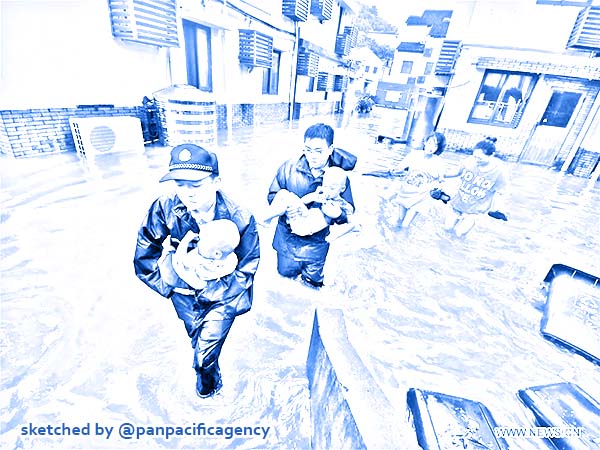Coronavirus and floods destroy China’s Dragon Boat Festival holiday plans

Policemen transfer the flood-stranded people in Putuo scenic area of Zhoushan City, east China's Zhejiang Province, Aug. 10, 2019. Typhoon Lekima, the ninth of the year, made landfall on Saturday in Wenling City. Rescue and clean-up works were carried out in all parts of Zhejiang Province. (Photo by Zou Xunyong/Xinhua). Sketched by the Pan Pacific Agency.
BEIJING, Jun 28, 2020, SCMP. China’s tourism revenues slumped by nearly 70 per cent during the three-day Dragon Boat Festival, as people shunned trips amid a new wave of coronavirus infections in the north and floods in the country’s southern provinces, South China Morning Post reported.
Chinese tourists made 48.8 million trips during the holiday, which ended on Saturday, only half the number recorded a year earlier. As a result, tourism revenue plunged by 69 per cent to 12.3 billion yuan (US$1.7 billion), according to the Ministry of Culture and Tourism.
The sluggish figures were due to the “dual challenges from the pandemic and floods”, the ministry said in a release on Saturday. In a bid to boost consumer confidence, the release avoided words suggesting declines. Instead, it said tourism was in the process of crawling back to a normal level.
The holiday, also known as Tuen Ng Festival, commemorates the death of Qu Yuan, a patriotic poet and politician who lived during the Warring States period around 2,300 years ago. China made it a statutory holiday in 2007 to promote Chinese culture and boost consumption.
Tourism demand this year was dampened by social distancing measures, especially China’s requirement that all tourist destinations should not run at more than 30 per cent of their capacity, according to the ministry.
Based on hotel and airline ticket booking figures, China’s largest online travel services provider Ctrip said the domestic tourism market had been recovering since March after a slump in February when the central Chinese city of Wuhan was in lockdown and the coronavirus pandemic was at its height.
However, the pace of growth in June slowed from the previous months, Ctrip said in a report released on Saturday.
In Beijing, official data showed 1.35 million trips were made to the city’s 161 tourist attractions during the Tuen Ng holiday, down 77 per cent from a year earlier. Tourism revenues declined by 76 per cent to 72 million yuan, driven lower by a new outbreak of Covid-19 which began on June 11 and has infected 311 people in the capital and put neighbouring destinations on alert.
As part of the control measures against the coronavirus, anyone who wants to leave Beijing must first have a nucleic acid test. The result is valid for seven days. Many local governments have extra requirements on people from Beijing, such as a period of quarantine, although China’s health authorities have suggested additional measures are unnecessary.
Zhou Yijie, a programmer in Beijing said he cancelled his travel plans to the eastern province of Anhui because he wanted to “avoid trouble”.
“When I thought about the procedure – from making a test appointment to get tested and waiting for the test result for days and possible mistreatment at the destination – I felt anxious,” he said. “In the end, I decided to just stay at home, going nowhere, and sleep 10 hours a day.”
Meanwhile, China is also experiencing an unusually intense flood season in southern China, with rainstorm alerts issued for 26 consecutive days in June. Weeks of torrential rain and heavy flooding have affected 14 million people in 26 provinces, including Guangxi, Guizhou, Guangdong, Hunan and Jiangxi.
Economists Larry Hu and Ji Xinyu at Macquarie Capital said slower income growth and social distancing were behind the country’s sluggish consumption recovery. While social distancing will phase out when the pandemic is brought under control, slower income growth was expected to weigh on people’s tourism spending and other consumption in the longer term.
“Offline services have been hit extremely hard by Covid-19, as consumers are shunning spending on human interaction,” they wrote in a research note. “The recovery so far has been soft, especially for those which are contact-intensive or require cross-region travel.”
Urban household disposable income only grew 0.5 per cent year on year in the first quarter, the lowest growth since 2003 when the data was first made available.